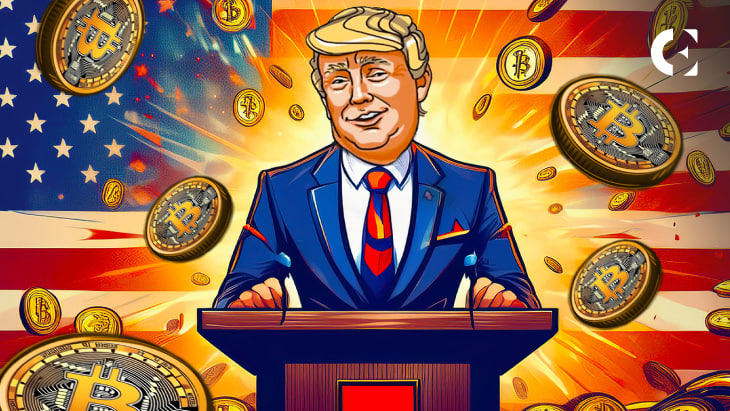- Trump’s tax cuts may drive inflation, impacting Fed’s easing policy on interest rates
- High tariffs aim to boost economic growth but risk supply chain strain, price hikes
- Bitcoin may shine as inflation hedge amid inflation concerns under Trump’s policies
With Donald Trump set to return to the White House, investors are closely watching what a second term could mean for the U.S. economy, financial markets, and Bitcoin.
Trump’s proposed economic agenda includes corporate tax cuts, deregulation, and increased tariffs on imports—policies that could shift market trends, raise inflation concerns, and influence the Federal Reserve’s monetary strategies. This anticipated direction is already causing fluctuations in asset prices, from U.S. Treasuries to crypto, as markets prepare for a growth-focused but potentially inflationary environment.
Tax Cuts and Deregulation: Economic Growth or Inflation?
Trump’s plans to reduce the corporate tax rate to 15% for U.S.-based manufacturers, down from the current 21%. He argues that these cuts will boost U.S. businesses and support stock market growth.
If enacted, these policies could lift corporate earnings and improve investor sentiment. However, critics caution that reduced taxes may fuel inflation by increasing spending in an already growing economy.
Broader tax cuts could also worsen government debt. Trump’s proposals are estimated to add over $7 trillion to the federal deficit over the next decade. Rising debt, coupled with inflationary pressures, might force the Federal Reserve to reconsider its current easing of interest rates, potentially complicating the financial outlook for businesses and consumers.
Tariff Increases: Economic Boost or Supply Chain Risk?
In addition to tax reforms, Trump’s proposal to impose tariffs as high as 60% on Chinese imports and 10% across the board aims to protect American manufacturing. While this could support domestic production, it also risks disrupting supply chains and driving up consumer costs.
Deutsche Bank estimates that Trump’s economic policies, excluding tariffs, could raise U.S. GDP by 0.5%, though the tariffs may offset half of that growth.
Implications for Bitcoin and Cryptocurrency Markets
As inflation concerns grow, Bitcoin and other cryptocurrencies may gain traction as a hedge against eroding purchasing power. During Trump’s first term, crypto markets experienced heightened volatility, partly influenced by his outspoken views on the dollar and economic policy.
Read also : Donald Trump Wins The U.S. Presidential Election: BTC Price Hits New All-Time High
Renewed inflation could strengthen Bitcoin’s role as “digital gold,” while Trump’s regulatory actions could reshape the crypto industry.
Wall Street is already reacting to Trump’s policies. 10-year Treasury yields have reached multi-month highs, and rising volatility across stocks and commodities may follow. While equity markets could benefit initially from lower corporate taxes, concerns over rising debt and inflation may dampen optimism, keeping investors cautious.
Disclaimer: The information presented in this article is for informational and educational purposes only. The article does not constitute financial advice or advice of any kind. Coin Edition is not responsible for any losses incurred as a result of the utilization of content, products, or services mentioned. Readers are advised to exercise caution before taking any action related to the company.







